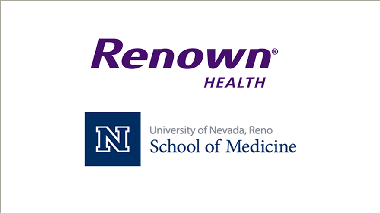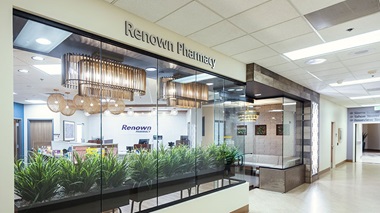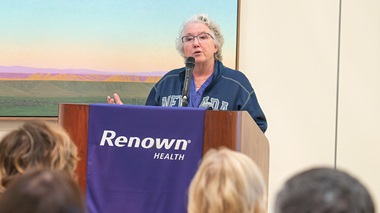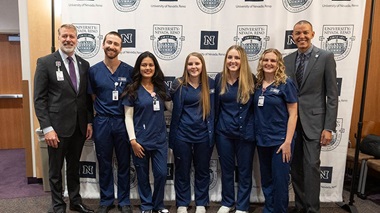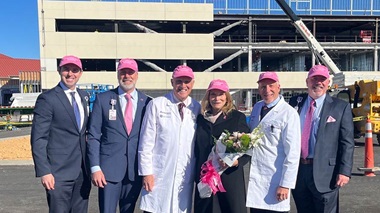Featured News
Careers
Awards & Accreditations
University of Nevada, Reno
Renown Health Foundation
Media Resources

Renown Health's public relations team supports media partners in finding experts on diverse health care topics. In addition, we provide information and answer all questions regarding Renown. We look forward to working with you.
-
Media On Campus
For patient confidentiality purposes, Renown Health policies require media to be escorted by the public relations staff at all times.
PR staff will gladly make parking arrangements, notify the appropriate hospital staff and help you find your destination.
Stand Ups/Live Broadcasts
Media may conduct stand ups and live broadcasts on our campuses. In the interest of patient confidentiality and traffic flow, a staff member will help you find the best location for your story.
We ask you to respect our obligation to protect our patients' well-being and legal right to privacy.
-
Patient Condition Inquiry
We follow regulations of the Health Insurance Portability and Accountability Act of 1996 (HIPAA) for all patients, including patients of public interest. HIPAA regulations specify which information may and may not be released without authorization from a patient.
Patient privacy regulations allow us to only share patient condition information about patients that appear in our directory.
Media inquiries require correct spelling of the patient's first and last name.
Definitions of "Condition" used by Renown Health
When describing a patient's condition, we can only release the following patient statuses:
Good - Vital signs such as pulse, temperature and blood pressure are stable and within normal limits. Patient is conscious, comfortable and there are no complications.
Fair - Vital signs are stable and within normal limits. Patient is conscious and alert although may be uncomfortable or in pain and may have minor complications.
Serious - Vital signs may be unstable or outside normal limits. The patient is acutely ill or injured and may have major complications.
Critical - Vital signs are unstable or outside normal limits. There are major complications.
Note: "Stable" is not a condition.
Press Releases
-
Research Shows Genetic Approaches to Breast Cancer Screenings Yield More Accurate Results
Clinical researchers with the Healthy Nevada Project co-author research paper with findings that emphasize the need for a comprehensive approach to breast cancer risk assessment – including a focus on genetic medicine – to help ensure that individuals at high risk are identified and supported proactively rather than reactively. Breast cancer is a leading cause of cancer death among women in the United States. According to the American Cancer Society, about 1 in 8 women will develop breast cancer and about 1 in 39 women will die from breast cancer. Breast cancer is associated with increased age, hereditary factors, obesity, and alcohol use. Since 1990, breast cancer death rates have declined progressively due to advancements in treatment and detection. In Nevada there are an estimated 2,310 new breast cancer cases a year, and genetic mutations such as in the genes BRCA1 or BRCA2 remain a top risk factor for this prevalent disease. Recognizing the urgency for progress in breast cancer research, a collaborative effort between physicians, advanced practice providers and scientists from the Healthy Nevada Project® (HNP) and Helix have unveiled groundbreaking research. This study explores how genetic screenings are a necessary supplement to traditional testing methods, together offering more accurate insights into a patient's likelihood of developing breast cancer in the future. HNP is operated by Renown Genomic Medicine and the Institute for Health Innovation and is one of the largest community-based population health studies in the country. Their team works in collaboration with Helix, a leader in precision health that delivers comprehensive genomic solutions. Together, this dynamic partnership aims to understand breast cancer risk factors and pave the way for more effective preventative measures. The combined research team studied 25,591 female HNP participants to evaluate the performance of different genetic screening approaches to identify women at high risk of breast cancer. The results of this research suggest that a combined monogenic, or single-gene, and polygenic, or multi-gene, approach to breast cancer screenings helped produce more accurate results and more closely identify study participants who have a high genetic risk of developing the disease. "Based on this research, we are advocating a shift in approach which would improve breast cancer risk assessment through a combination of effective family history ascertainment and genetic screening,” said Joseph Grzymski, PhD, principal investigator of the Healthy Nevada Project, research professor at the University of Nevada, Reno School of Medicine and co-author of the breast cancer research paper. “This tailored approach, founded on the assessment of individual genetic risk, not only intends to elevate patient well-being but also will improve efficiency and equity in healthcare." Complementing the team’s research on leveraging genetics to identify women at low genetic risk of breast cancer that could safely defer mammogram screenings by five to 10 years that was released in late 2023 in JAMA Oncology, the study suggests that incorporating genetic information can assist in personalizing breast cancer screenings and optimizing the use of screening resources. "Existing disparities persist across various facets of breast cancer screening and treatment; however, genetic screening is clearly a powerful tool to help facilitate early intervention for those at higher risk,” said Jamie Schnell Blitstein, APRN, a primary care nurse practitioner at Renown Health and co-author of the breast cancer research paper. “By placing a heightened focus on risk, we underscore the pivotal role of preventative breast cancer screening.” Despite the availability of effective methods for early screening, co-authors of this research found that 78 percent of women with a family history of breast cancer had their risk ascertained only after a breast cancer diagnosis. The findings emphasize the need for a comprehensive approach to breast cancer risk assessment – including a focus on genetic medicine – to help ensure that individuals at high risk are identified and supported proactively rather than reactively. “These findings that can profoundly impact how healthcare is delivered were only made possible by all the participants who were willing to consent to research,” said Alex Bolze, PhD from Helix and co-author of the publication. “Broad-scale collaboration projects like these between Renown Health and UNR that engage large populations where participants share both their genetic information as well as electronic health records drive advancements in preventative medicine, as well as fundamental biological research.” The research paper was officially accepted on Jan. 29, 2024, and will be published by Elsevier, Inc. on behalf of the American College of Medical Genetics and Genomics. The contents of the paper will appear in the international journal Genetics in Medicine Open. Read the full article by visiting sciencedirect.com. The Healthy Nevada Project is currently recruiting new study participants. Free to all Nevadans with a saliva sample or blood draw, participants and their referring providers receive access to whole-exome sequencing and clinical grade results that help provide insight into their unique genetic risks tied to heart disease and certain cancers. If you are interested in enrolling in the study, schedule a Virtual Consent Appointment through MyChart or contact the Renown Institute for Health Innovation at RenownIHI@renown.org or (775) 982-6914 to be connected to a Genomic Representative. About Renown Health Renown Health is the region’s largest, not-for-profit integrated healthcare network serving Nevada, Lake Tahoe and northeast California. With a diverse workforce of more than 7,000 employees, Renown has fostered a longstanding culture of excellence, determination and innovation. The organization comprises a trauma center, two acute care hospitals, a children’s hospital, a rehabilitation hospital, a medical group and urgent care network, and the region’s largest, locally owned not-for-profit insurance company, Hometown Health. Renown is currently enrolling participants in the largest community-based genetic population health study, the Healthy Nevada Project®. To join the Renown Health team, visit renown.org/careers. About Helix Helix is the leading population genomics and viral surveillance company operating at the intersection of clinical care, research, and data analytics. Helix enables health systems, life sciences companies, payers, and government partners to accelerate the integration of genomic data into patient care and public health decision-making. Learn more at helix.com.
-
Awareness Saves Lives: Renown Goes Blue for Colorectal Cancer Awareness Month
After a year of possibly delayed colorectal cancer screenings due to theCOVID-19 pandemic, it’s more important than ever to raise awareness for colorectal cancer. March is National Colorectal Cancer Awareness Month- a time to raise awareness for colorectal cancer and the importance of routine, life-saving screenings. Renown invites the community to join the organization in helping put an end to the preventable disease. Blue is the designated color to bring awareness to colorectal cancer and those impacted by it. The iconic “LOVE” sculpture at the main entrance of Renown Regional Medical Center located at 1155 Mill Street in Reno, Nev. will shine brightly in blue each evening in March, serving as a visual reminder to passersby to schedule a colorectal screening. The Colorectal Cancer Alliance estimates 149,500 new cases of colon cancer will present in 2021 alone. While colorectal cancer may be the second deadliest cancer in men and women combined, it is also one of the most preventable cancers with screenings. “Unfortunately, due to the COVID-19 pandemic, there’s been a decline in colorectal screenings nationwide,” said Tony Slonim, MD, DrPH, President and CEO of Renown Health. “We know early detection is key in preventing the spread of any cancer, and with regular screenings, we know colorectal cancer is easily detectable and treatable. As a cancer survivor, I know how important it is to get back on track with regular screenings and preventive care. Making your health a priority now will help you experience a healthier and brighter tomorrow.” “We invite the community to join us at Renown in spreading awareness about colorectal cancer and its prevention,” said Susan Cox, director of cancer services at the Renown Institute for Cancer. “It takes all of us to put an end to colorectal cancer. If you’re up to date on your screenings, remind a loved one to schedule their next screening--as your reminder may have the power to save their life.” “Colorectal cancer usually forms from precancerous polyps, or abnormal growths, in the colon or rectum, which can become malignant without presenting any symptoms. Screening tests like stool tests, colonoscopies, and others can detect these precancerous polyps, so they can be removed by a physician before turning into cancer. Screening tests can also find colorectal cancer early, resulting in better treatment outcomes,” says Christos Galanopoulos, M.D., MBA, oncologic surgeon, VP Renown Health & Chair of Surgery for Renown Health. Dr. Galanopoulos adds, “Most people begin screening for colorectal cancer after turning 50. However, some individuals may begin screenings earlier if they have an increased risk of colorectal cancer, such as a family history with the disease. Regardless of one’s personal or family history of colorectal cancer, it’s important to talk to your doctor about the right time to begin your screenings.” Max J. Coppes, MD, Cancer Center Director, Renown Institute for Cancer adds, “While routine screenings are the only way to determine colorectal health, some healthy habits may reduce your risk for colorectal cancer. These factors include maintaining a healthy weight, being physically active, eating a diet rich in fresh fruits, vegetables and whole grains, limiting alcohol intake and not smoking.” Dr. Coppes explains that, “1 in 500 Americans will test positive for Lynch Syndrome, a genetic condition that raises your risk of colon cancer, endometrial cancer, and other cancers. It is also known as hereditary nonpolyposis colorectal cancer. People with Lynch Syndrome are also susceptible to colon polyps at a younger age. The Healthy Nevada Project research team is looking at the occurrence of important inherited genetic variants in our population that increase the risk of certain diseases. These include Familial Hypercholesterolemia, Hereditary Breast and Ovarian Cancer Syndrome and Lynch Syndrome.” To enroll in The Healthy Nevada Project, a clinical study (saliva test) offering the opportunity to learn about your ancestry, diet insights and genetic risks linked to heart disease and certain cancers, including prevention strategies, at no cost, enroll here. For a limited time, Nevada residents may request a free DNA test kit that will be shipped to your home. Renown experts encourage every adult to talk to their doctor about their colorectal cancer risk and screening options. Those looking to schedule a screening or establish care with a Renown primary care provider are invited to call us at 775-691-7308 or visit our website for more information. About Renown Health Renown Health is the region’s largest, locally owned and governed, not-for-profit integrated healthcare network serving Nevada, Lake Tahoe and northeast California. With a diverse workforce of more than 7,000 employees, Renown has fostered a longstanding culture of excellence, determination and innovation. The organization comprises a trauma center, two acute care hospitals, a children’s hospital, a rehabilitation hospital, a medical group and urgent care network, and the region’s largest, locally owned not-for-profit insurance company, Hometown Health. Renown’s institute model addresses social determinants of health and includes: Child Health, Behavioral Health & Addiction, Healthy Aging and Health Innovation. Clinical institutes include: Cancer, Heart and Vascular Heath and Neurosciences. Renown is currently enrolling participants in the world’s largest community-based genetic population health study, the Healthy Nevada Project®.
Read More About Awareness Saves Lives: Renown Goes Blue for Colorectal Cancer Awareness Month

